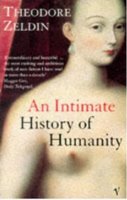
Ten years ago I discovered the remarkable book An Intimate History of Humanity, by Theodore Zeldin. This was published in 1994.
This is an investigation of emotions and personal relationships which looks at how people, past and present, escape from loneliness, fear and aimlessness, find new forms of affection and adventure, and can avoid being prisoners of their memories or mistakes.
The Boston Sunday Globe acclaimed the author as “… a modern day Balzac”.
Here’s the Preface of the book.
Our imaginations are inhabited by ghosts. Here are the results of my investigations of the familiar ghosts which reassure, the lazy ones which make us obstinate and, above all, the frightening ones which discourage. The past haunts us, but from time to time people have changed their minds about the past. I want to show how, today, it is possible for individuals to form a fresh view both of their own personal history and of humanity’s whole record of cruelty, misunderstanding and joy. To have a new vision of the future, it has always first been necessary to have a new vision of the past.
Each of my chapters begins with the portrait of a living person who has desires and regrets in which you may perhaps recognise something of yourself, but who is also restrained by attitudes inherited from origins long forgotten. The mind is a refuge for ideas dating from many centuries, just as the cells of the body are of different ages, renewing themselves or decaying at varying speeds. Instead of explaining the peculiarity of individuals by pointing to their family or childhood, I take a longer view: I show how they pay attention to – or ignore – the experience of previous, more distant generations, and how they are continuing the struggles of many other communities all over the world, whether active or extinct, from the Aztecs and the Babylonians to the Yoruba and the Zoroastrians, among whom they have more soul-mates than they may realise.
You will not find history laid out in these pages as it is in museums, with each empire and each period carefully separated. I am writing about what will not lie still, about the past which is alive in people’s minds today. However, before I explain what I want to do with these ghosts, I should like to introduce you to few of them.


2 comments:
Yes, it is a fascinating book, I discovered it too and have it on my shelves.
"To have a new vision of the future, it has always first been necessary to have a new vision of the past." Indeed. It must be rewritten from a new perspective, a new paradigm.
Post a Comment